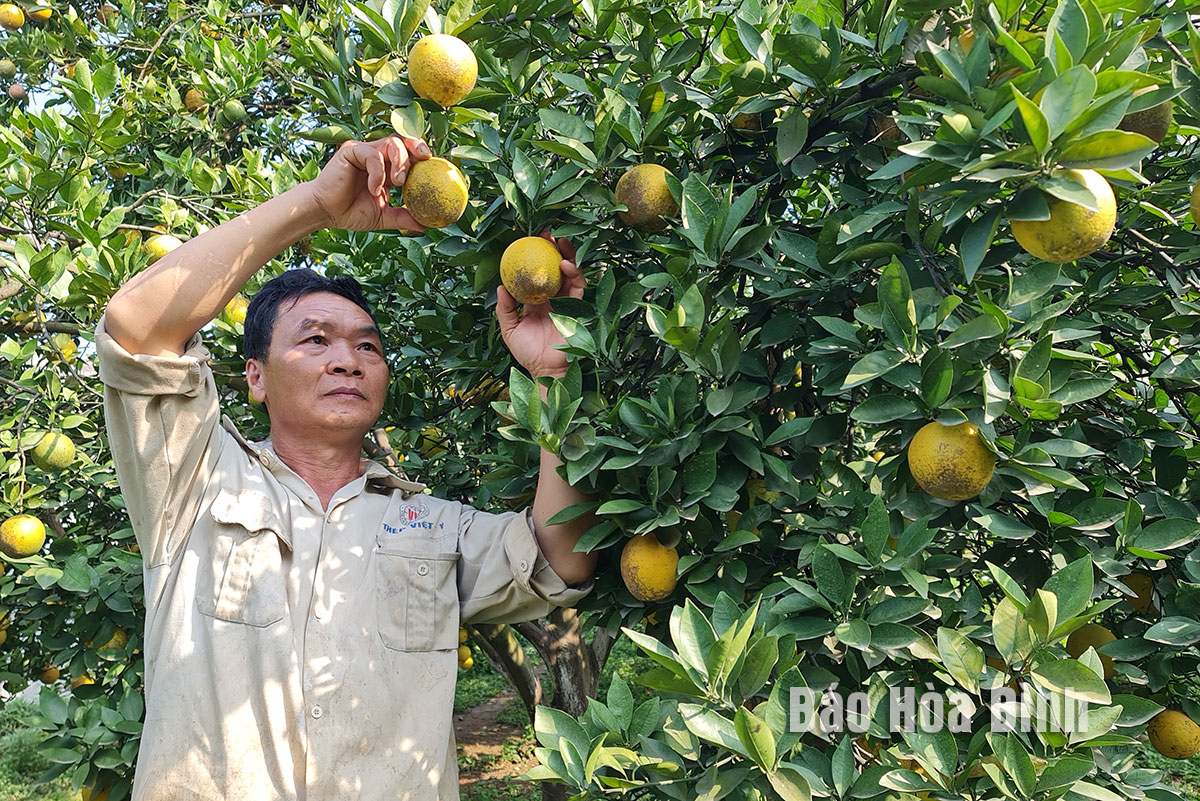
The Cao Phong orange has emerged as a shining example of sustainable agricultural development in Hoa Binh province, distinguished as the first and only locally produced agricultural product to receive a geographical indication certification. Renowned for its thin skin, juicy flesh, and delicate sweet flavour, the fruit has won the heart of consumers for years. Local farmers have made their efforts to cultivate environmentally friendly and consumer-safe products, creating a stable and sustainable brand identity.
Nguyen Van Truong, a farmer in De hamlet, Bac Phong commune, visits his orange orchard.
Nguyen Van Truong, a farmer from De hamlet in Bac Phong commune, represents the pinnacle of this agricultural ethos. His 17-year-old orange orchard stands as a testament to safe cultivation practices. Truong invested more than 600 million VND (over 23,600 USD) in land improvement, irrigational system, and fertiliser for sustainable plantation practices.
Grown under VietGAP standards, Cao Phong orange boats exceptional taste and ensure absolute consumer safety. Although the method may reduce overall yield as compared to traditional techniques, it is a strategic choice for many farmers who want to maintain, preserve and develop local orange brand.
Agricultural cooperatives have strictly complied with clean orange cultivation over the recent past. Notably, 3TFarm has converted more than 20 hectares of orange plantations to VietGAP standards, committing to supplying the market with environmentally-friendly and safe products.
Cao Phong district is now home to over 715 hectares of oranges. It expects to harvest 20,348 tonnes of the fruit this crop, enjoying an average yield of 302 quintals per hectare.
While only 172 hectares are currently certified under VietGAP, all of the orange plantations are using biological compounds and microbial fertilisers to create safe, high-quality, and ecologically responsible agricultural products.
According to Vice Chairman of the district People’s Committee Bui Hoai Nhi, along with improving the fruit’s quality, the district has paid due regard to protecting and developing its orange brand through the careful selection of seedling varieties, management over production process, and establishment of traceability system, among others.
Besides, the locality has invested in concentrated plantation infrastructure and supported local producers to obtain food safety certifications.
According to data from the Hoa Binh Provincial Party Committee, the industrial production index for the first six months of 2025 is estimated to have increased by 20% compared to the same period last year. This marks the highest year-on-year growth rate for this period since 2020.
In the first six months of 2025, Hoa Binh province’s export turnover was estimated at 1.145 billion USD, marking an 18.11% increase compared to the same period in 2024. Import turnover was estimated at $ 804 million, a 17.15% increase, which helped the province maintain a positive trade balance.
The lives of the ethnic minority farmers in Tan Lac district have gradually improved thanks to the new directions in agricultural production. This is a testament to the collective strength fostered through the professional associations and groups implemented by various levels of the district’s Farmers’ Union.
With the motto the "product quality comes first,” after nearly one year of establishment and operation, Muong village’s Clean Food Agricultural and Commercial Cooperative, located in Cau Hamlet, Hung Son Commune (Kim Boi district), has launched reputable, high-quality agricultural products to the market that are well-received by consumers. The products such as Muong village’s pork sausage, salt-cured chicken, and salt-cured pork hocks have gradually carved out a place in the market and they are on the path to obtaining the OCOP certification.
In the past, the phrase "bumper harvest, rock-bottom prices" was a familiar refrain for Vietnamese farmers engaged in fragmented, small-scale agriculture. But today, a new spirit is emerging across rural areas of Hoa Binh province - one of collaboration, organisation, and collective economic models that provide a stable foundation for production.
Maintaining growing area codes and packing facility codes in accordance with regulations is a mandatory requirement for agricultural products to be eligible for export. Recently, the Department of Agriculture and Environment of Hoa Binh province has intensified technical supervision of designated farming areas and packing facilities to safeguard the "green passport" that enables its products to access international markets.



